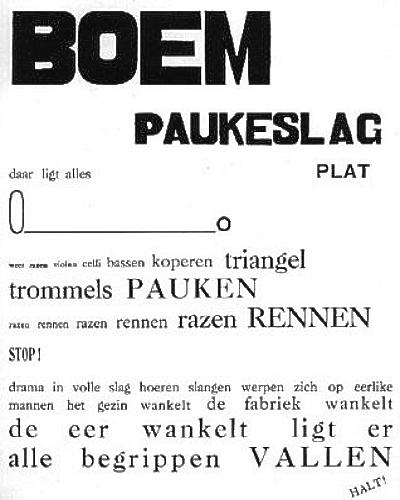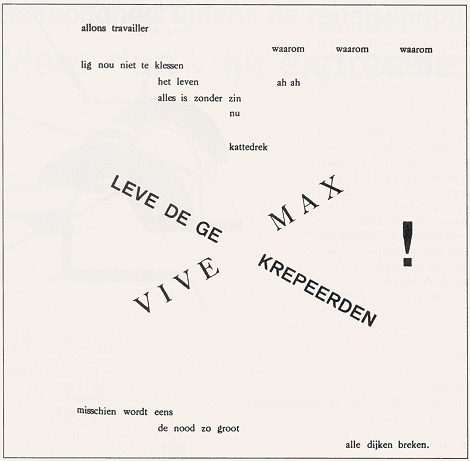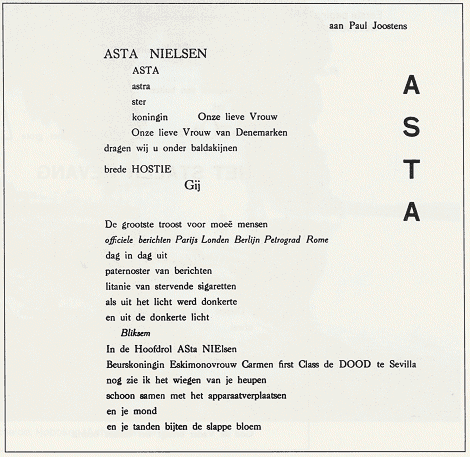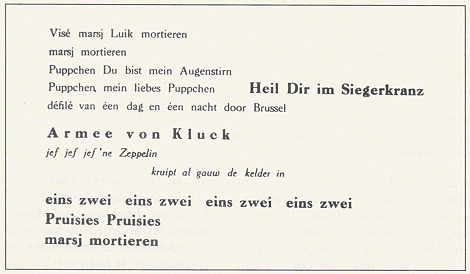Image may be NSFW.
Clik here to view.
Clik here to view.

Paul van Ostaijen
Paul van Ostaijen (22 febrero 1896 a 18 marzo 1928) fue un poeta y escritor belga.
Apodo
Van Ostaijen nació en Amberes. Su apodo era el señor de 1830, derivado de su costumbre de caminar por las calles de Amberes vestido como un dandi de ese año.
Su poesía muestra influencias del modernismo, expresionismo, dadaísmo y principios del surrealismo, pero el estilo de Van Ostaijen es muy particular.
Flamingant
Van Ostaijen fue un activo flamingant, un partidario de la independencia de Flandes. Debido a su participación en Flamenco activismo durante la Primera Guerra Mundial, tuvo que huir a Berlín después de la guerra. En Berlín -uno de los centros del dadaísmo y el expresionismo- conoció a muchos otros artistas. Él también luchó con una crisis mental grave.
A su regreso a Bélgica, Van Ostaijen abrió una galería de arte en Bruselas. Murió de tuberculosis en 1928 en un sanatorio en Miavoye-Anthée, en las valonas Ardenas.
El poeta checo Ivan Wernisch quedó tan impresionado por "el genio de van Ostaijen" que aprendió holandés para ser capaz de traducirlo. Su traducción fue publicada como gnómů Tanec, Danza de los gnomos, en 1990.
Poesía
Music hall (1916)
Het sienjaal ( The signal , 1918)
Bezette stad ( Occupied city , 1921)
Feesten van Angst en Pijn ( Feasts of Fear and Pain , written 1921, published posthumously)
Nagelaten gedichten ( Posthumous poems , published posthumously in 1928)
De los Poemas póstumos:
Zelfmoord des Zeemans
De zeeman
hij hoort de stem der Loreley
hij ziet op zijn horloge
en springt het water in
[The Sailor's Suicide
The sailor
he hears the call of the Loreley
he looks at his watch
and jumps into the water]
Otras publicaciones
De trust der vaderlandsliefde ( The trust of patriotism , 1925, grotesques )
Gebruiksaanwijzing der lyriek ( Manual of lyrics , 1926, lecture)
Het bordeel van Ika Loch ( Ika Loch's brothel , 1926, grotesques)
De bende van de stronk ( The stump gang , 1932, grotesques)
Verso 5
Me gustaría un número de jazz basado en la tonada de «Frère Jacques»
es una pena que no pueda tocar
triquitrac triquiíriquitriquitrac
en mi pueblo natal
madre
aquí tienes
al joven tan prometedor
entre arañas protestantes y catedráticos
yo
el último católico
el último gnóstico
VEDLO AQUÍ
AL ULTIMO
¡ALTO CATÓLICO
el último heresiarca
de la doctrina de la inmanencia
hijo de Montanus y Maxímilla
hija de Catalina Emmerick y del Maestro Eckehart
Sainte Madame Jeanne Marie Bouviéres de la
Mothe Guyon
priez pour moi
catedráticos he aquí al último gnóstico
fumando un cigarrillo mientras se beneficia
la Eucaristía
pero no sé
no sé
Me gustaría estar desnudo
mi lengua es un gusto amargo
a lo mejor es el veneno
Soy un hijo
Una hija soy!
tengo miedo
y me gustaría un número de jazz basado en la tonada de
FRÈRE JACQUES
Antología de la poesía neerlandesa moderna (Ediciones Saturno, Barcelona, 1971, selecc. y trad. de Francisco Carrasquer).
Image may be NSFW.
Clik here to view.

Geología
Hondos mares rodean la isla
hondos azules mares rodean la isla
tú no sabes
si la isla de las estrellas está allá arriba
tú no sabes
si la isla está en el eje de la tierra
hondos mares
hondos azules mares
en que la sonda se hunde
en que la sonda se busca
en hundiéndose busca
y busca hundiéndose
buscando su propia busca
y sin cesar
se hunde
y sin cesar
busca
hondos mares
azules mares
hondos azules mares
mares de azul profundo
se hunden
buscan
las volcadas estrellas
dos veces azules
y dos veces sin fondo
Cuándo encuentra la sonda azul
en el mar azul
el alga verde
y el banco de coral
Un animal persigiuendo en su vida un pensamiento
—aspiración con milenios de milenios sellada—
igual que un animal que caza y halla en sus dedos ciegos
sólo el repetir de hacer lo hecho
igual que un animal así
así se hunde la sonda
del marino
Si este hundirse se colara por tus ojos abajo tú no sabrías
de un mayor vacío.
Antología de la poesía neerlandesa moderna (Ediciones Saturno, Barcelona, 1971, selecc. y trad. de Francisco Carrasquer).
Image may be NSFW.
Clik here to view.![]()
Clik here to view.

Melopea
Bajo la luna se desliza el largo río
sobre el largo río, cansada, se desliza la luna
bajo la luna, sobre el largo río, se desliza la barca hacia el mar.
Entre las altas cañas
entre los bajos sotos
se desliza, con la luna deslizante, la barca hacia el mar
Así van juntos, hacia el mar, la luna y el hombre
Por qué se deslizan los dos la luna y el hombre dócilmente hacia el mar.
Antología de la poesía neerlandesa moderna (Ediciones Saturno, Barcelona, 1971, selecc. y trad. de Francisco Carrasquer).
Image may be NSFW.
Clik here to view.

Una caja de música muy pequeña
Amarilis
está ahí
en la pompa
jabonosa
está Iris
y la pompa suspendi-
da de un ani-
llo y el ani-
llo en tu nariz
Amarilis
La cabeza menea
y la luz juguetea
en la pomposa esfera
con Iris
Sacude con más aire
hasta que estalle
Amarilis
Dónde está di
Iris
Iris estaba aquí
Amarilis
en un ani-
llo y el ani-
llo en tu nariz
Sabidi-
lla nariz
Amarilis
Antología de la poesía neerlandesa moderna (Ediciones Saturno, Barcelona, 1971, selecc. y trad. de Francisco Carrasquer).
Image may be NSFW.
Clik here to view.![ilustración]()
Clik here to view.

FACTURE BAROQUE
Soms
— wanneer de boten van hun zinnen sloegen
aan de immer deinende rotswand
van een reuk die openstaat
op wonderlike dieren
en planten die
koortsdoorschoten
tussen de blauwheid van de zee en de blauwheid van de lucht
slechts zijn een vergelijken —
soms slaat het verlangen der mensen zo hoog uit
dat zij takelen de nederige boot
en ter zee gaan
in de zeilen speelt de wind een waan
een oude waan
die over de kim gekelderd lag
tot de wind de hulzen stuk woei
en uit de scherven walmt de wijn van deze waan
van deze oude waan
Geen kent het S.O.S.-gesein geenzijds der zinnekim
en dat aan de boôm van onze ziel er sprieten steken
die alleen het trillen vatten
van gene zijde
Soms dringt de drang de droom tot een gestalte
en wordt het lichaam droom
Image may be NSFW.
Clik here to view.![ilustración]()
Image may be NSFW.
Clik here to view.

BAROQUE ACCOUNT
Sometimes
— when the boats of their senses' beat
against the ever-swelling cliff
of a fragrance that's sti1l open
to fantastic beasts
and plants that
shot through with fear
between the sea's blue and the blue of the sky
are a sheer metaphor —
sometimes desire flames up in people so high
that they tackle the flimsy boat
and take to sea
the wind plays a delusion in the sails
an old delusion that lies
in a slump beyond the horizon
till the wind has blown the hull to bits
and from the pieces wafts the wine of the delusion
this old delusion
None knows the SOS beyond the senses' horizon
and that at the bottoms of our souls there are antennae
that pick up only the vibrations
from beyond
Sometimes the urge will force the dream into a shape
and the body turns to dream
© Translation: 1982, James Holmes
ALPEJAGERSLIED
Voor E. du Perron
Een heer die de straat afdaalt
een heer die de straat opklimt
twee heren die dalen en klimmen
dat is de ene heer daalt
en de andere heer klimt
vlak vóór de winkel van Hinderickx en Winderickx
vlak vóór de winkel van Hinderickx en Winderickx van de
beroemde hoedemakers
treffen zij elkaar
de ene heer neemt zijn hoge hoed in de rechterhand
de andere heer neemt zijn hoge hoed in de linkerhand
dan gaan de ene en de andere heer
de rechtse en de linkse de klimmende en de dalende
de rechtse die daalt
de linkse die klimt
dan gaan beide heren
elk met zijn hoge hoed zijn eigen hoge hoed zijn bloedeigen hoge hoed
elkaar voorbij
vlak vóór de deur
van de winkel
van Hinderickx en Winderickx
van de beroemde hoedemakers
dan zetten beide heren
de rechtse en de linkse de klimmende en de dalende
eenmaal elkaar voorbij
hun hoge hoeden weer op het hoofd
men versta mij wel
elk zet zijn eigen hoed op het eigen hoofd
dat is hun recht
dat is het recht van deze beide heren
BERSAGLIERI SONG
for E. du Perron
A gentleman going up the street
a gentleman going down the street
two gentlemen going up and down
that is the one gentleman goes up
and the other gentleman goes down
right in front of the shop of Henryson and Wenryson
right in front of the shop of Henryson and Wenryson
the famous hatmakers
they meet each other
one gentleman takes his high hat in his right hand
the other gentleman takes his high hat in his left hand
the one gentleman and the other
the right and the left the one going up and the one going down
the left going up
the right going down
each with his high hat his own high hat his bloody own high hat
pass each other
right in front of the door
of the shop
of Henryson and Wenryson
the famous hatmakers
then the two gentleman
the right and the left the one going up and the one going down
once past each other
put their hats on their heads again
don't misunderstand me
each puts his own hat on his own head
that is their right
that is the right of these two gentlemen
© Translation: 1982, James Holmes
BOERE-CHARLESTON
Tulpebollen bolle tulpen tulpetuilen
rozetuilen
boererozen boerewangen boerelongen
boerelongen ballen wangen
wangen ballen bekkens
ballen bolle bekkens
bugel en basson — o hop!
wie heeft er de kleine bugel gezien
wie heeft er de grote bugel gezien
en wie Gaston met zijnen basson
Marie-Katelijne Marie-Katerien
want dit is geen pavane of geen sarabande meer
dat is geen gigue of geen allemande meer
en geen wals
dat is 'nen charleston
'nen boerecharleston
van Gaston op zijnen basson
En wie heeft er de kleine bugel gezien
en wie heeft er de grote bugel gezien
en wie Gaston met zijnen basson
De kleine bugel zit in 'nen rozetuil
bij Rozalie
de grote bugel zit in de sjees
bij Melanie
Marie-Katelijne Marie-Katerien
En Gaston
die zit «In de Ton» ik vraag u pardon
Bolle wangen ballen bekkens
bugel en basson
COUNTRY CHARLESTON
Tulip bulbs and bulbs of tulips tulip petals
rose petals
farmers' roses farmers' faces farmers' fumes
farmers' fumes and dancing faces
faces dancing basses
dancing bulbs and basses
bugle and bassoon — 0 hop!
Marie Cathleen Marie Katrine
who has seen the little bugle
who has seen the big bugle
who's seen Mister June with his bassoon
for this is no pavanne or saraband now
this is no gigue or allemand now
and not a waltz
this is the charleston
the country charleston
by Mister June on his bassoon
and who has seen the little bugle
and who has seen the big bugle
who's seen Mister June and his bassoon
The little bugle's sitting by the roses
with Rosalie
the big bugle's sitting in the buggy
with Melanie
Marie Cathleen Marie Katrine
and Mister June
are sitting in the saloon I mean Café La Lune
Bulbs and faces dancing basses
bugle and bassoon
© Translation: 1982, James Holmes